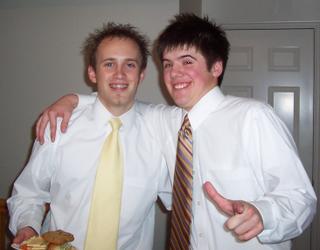"The other night we had a Festa Junina at the Soup Kitchen. It was pretty cool. It celebrates something about three of the Saints in the Catholic Church. So there we were, the Mormon Boys, eating hot dogs and drinking hot cocoa, gathered around a fire celebrating the saints with all of our Catholic friends. It honestly was pretty fun. They are way nice and we plan on baptizing all of them, even Paulo, the ringleader."
Brazilians celebrate the month of June with parties that can be even bigger than Carnaval in some cities. Those parties are called Festas Juninas and they celebrate saints Anthony, John and Peter with lots of traditional foods, drinks and a theatrical dance inherited from the French called quadrilha (a type of square dance).
However, the origin of this party is much older than Brazil itself. It began in Europe. The month of June being the beginning of the summer, bring crops that the population celebrated with parties and ceremonies. All over Europe, people used to make bonfires on hilltops and plains to dance around and jump over. Part of the ceremonies also was to offer the fire some of the crop and even live animals to bring luck for the next crop season. From this old practice, came the tradition of bonfires in Festas Juninas.
Nowadays, Brazilians do not thank for the crops because in South America this is not the crop season. As for the celebrations they extend throughout the month, commemorating Saint Anthony on June 13, Saint John on June 24, and Saint Peter on June 29.
Every Festa Junina has a tall pole with a Saint John image hanging on it. Tradition says that Elizabeth, Saint John's mother, used a tall pole to announce the son's birth to Saint John's aunt, Mary who was expecting Jesus. In Brazil, this pole was transformed into a special attraction; it is the so-called pau-de-sebo (greased pole). The pole is covered with grease and money or any other kind of prize is placed on its top.
When the French missionaries came to Brazil they brought the quadrilha, which is a theatrical dance that tells the story of a marriage in a small town. Due to its origin, even today you still see some French words in the quadrilha lyrics, terms like anavam, anarrié, granche, balancê, travessê, devaiê and tour. And the quadrilha became the official dance of a Festa Junina.






